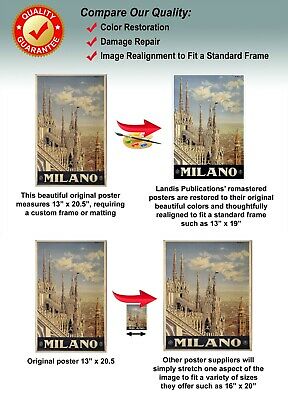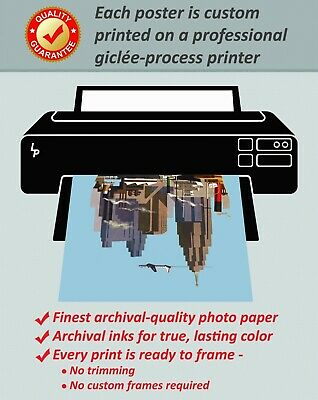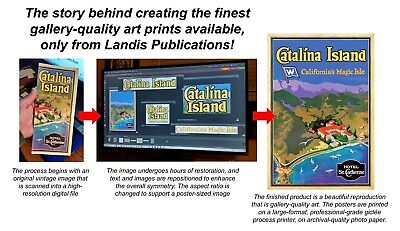-40%
Squaw Valley Lake Tahoe Vintage 1950’s Advertising Poster
$ 10.53
- Description
- Size Guide
Description
These are simply the best posters available! You will be thrilled with the image quality, vivid colors, fine paper, and unique subjects. This is an original image that has been transformed into a beautiful poster - available exclusively from Landis Publications.
OUR POSTERS ARE SIZED FOR STANDARD OFF-THE-SHELF FRAMES, WITH NO CUSTOM FRAMING REQUIRED, PROVIDING HUGE COST SAVINGS!
This beautiful reproduction poster has been re-mastered from a 1950's Squaw Valley, Lake Tahoe ski advertising brochure.
The vibrant colors and detail of this classic image have been painstakingly brought back to life to preserve a great piece of history.
The high-resolution image is printed on heavy archival photo paper, on a large-format, professional giclée process printer. The poster is shipped in a rigid cardboard tube, and is ready for framing.
The 13"x19" format is an excellent image size that looks great as a stand-alone piece of art, or as a grouped visual statement. These posters require
no cutting, trimming, or custom framing
, and a wide variety of 13"x19" frames are readily available at your local craft or hobby retailer, and online.
A great vintage print for your home, shop, or business!
SQUAW VALLEY HISTORY
Former University of Nevada star skier, Wayne Poulsen, purchased the first 2,000 acres (8.1 km2) of Squaw Valley Ski Resort from the Southern Pacific Railroad. Poulsen already had a history in the area: in 1931, he had placed third at an Olympic trials at Granlibakken in Tahoe City. Shortly after, Poulsen met Harvard alumnus and trained lawyer Alex Cushing, who brought capital, political connections, and increased access to the project. Cushing had fallen in love with Lake Tahoe after a visit to the Sierras in 1946. After a disagreement over the resort's future, Cushing gained control of the project and became the chairman of Squaw Valley Ski Corporation. The resort opened in 1949, and Cushing remained its chairman until his death.
Cushing modeled the resort after European ski destinations. He re-engineered the model of traditional U.S. ski resort by locating a swimming pool, ice rink, roller disco, and restaurants on the mountain instead of at the base. His designs also brought the most advanced lift technology to the U.S. for the first time. When Squaw Valley opened, its Squaw One lift was deemed the longest double chairlift in the world.
Squaw Valley's enormous success can be largely attributed to the visibility that came from hosting the 1960 Winter Olympics, a direct result of Cushing's effort and determination. During the planning stages of the 1960 Olympics, Innsbruck, Austria, was the leading choice for the Olympic site. In 1955, however, Cushing secured the bid after winning over the International Olympic Committee in Paris with a scale model of his planned Olympic site. The Winter Olympics in 1960 were the first to be televised live, making the games accessible to millions of viewers in real-time. The event signaled the rise of U.S. skiing to the level of world-famous European skiing, and Squaw Valley's preparedness for the games showed the international community that U.S. ski resorts offered world-class facilities.
Squaw Valley hosted World Cup races in 1969 with four technical events: slalom and giant slalom for both men and women. American Billy Kidd won the men's slalom, followed by U.S. teammates Rick Chaffee (4th) and Spider Sabich (10th) of Kyburz. The 1969 season saw a record snowpack at Squaw Valley; and over eight feet (2.4 m) of new snow cancelled the downhills. After an absence of 48 years, women's technical races returned in 2017 and overall leader Mikaela Shiffrin of Colorado won both events.
In 1978, Squaw Valley experienced one of the worst cable car accidents in history. On a stormy afternoon late in the season on Saturday, April 15, the Tram came off of one of its cables, dropped 75 feet (23 m) and then bounced back up, colliding with a cable which sheared through the car; four were killed and 31 injured.
Squaw Valley was purchased by KSL Capital Partners in November 2010. A year later, Squaw Valley and Alpine Meadows Ski Resort merged under the new umbrella leadership of Squaw Valley Ski Holdings, LLC. The new company operates as one, with joint lift tickets and single season passes for visitors and free shuttles between its locations, but preserves the individuality of the two resorts.
Squaw Valley was designated a California Historical Landmark in 1960 during the Olympic Games. The area was dubbed the Pioneer Ski Area of America, commemorating 100 years of skiing in nearby Sierra Nevada mining towns that were the first U.S. locations where organized skiing took place.













